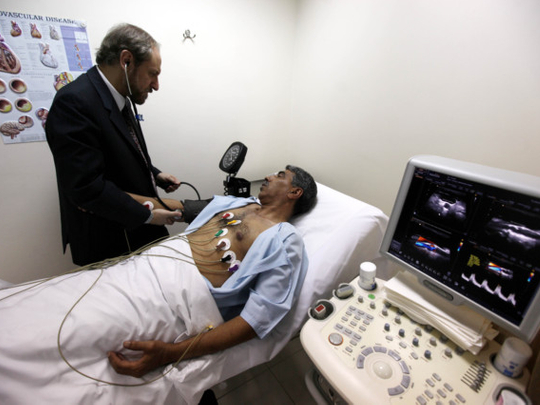
Dubai: The countdown to World Heart Day (September 29) has begun, with doctors here and abroad reiterating they can only do so much to curb lifestyle diseases whose prevention mainly lies with patients themselves.
Each year 17.3 million people worldwide die of heart disease and stroke, according to the World Heart Federation, making Cardiovascular Diseases (CVD) the biggest killer globally.
The UAE has one of the highest rates of CVD and lifestyle diseases like hypertension, diabetes, and obesity. Doctors in Dubai said on Wednesday that lifestyle diseases often lead to life-threating heart problems.
They made the comments at a press conference to announce the International Conference on Lifestyle Disorders, taking place in Dubai on Friday. The conference will reveal the latest figures on some of those disorders in the UAE and region, and discuss trends and treatments, said the organiser, Aster, a large healthcare provider in the Middle East and India.
The UAE, for example, is in the top 10 for countries with high diabetes prevalence. One in nine adults in the region has diabetes, and more than half of people with diabetes in the region don’t even know they have it, according to research cited by Aster.
“Hypertension is also among the top lifestyle disorders which increasingly leads to several fatal diseases in the region, especially in the UAE,” it added.
Aster, part of the DM Healthcare group, is organising the Friday event in association with global pharmaceutical giant Novartis, at Murooj Rotana Hotel in Dubai.
Dr P.M.M. Sayed, Medical Director-Aster Medical Centre, said: “This [prevalence of lifestyle disorders] is bad news. It’s a disease of affluence. The good news is we can change our lifestyle.”
Specialists said the disorders can be offset or controlled by healthy living – balanced diet and exercise. Avoiding tobacco is another way to curb the ailments, they added.
Prakash Pania, specialist endocrinologist at Aster Jubilee Medical Complex-Dubai, described the problem as an “epidemic” that was “peaking in the UAE”.
He blamed most of the rise on a fast-food culture, work stress and physically inactive lifestyle.
Though doctors at the press conference did not mention latest figures, organisers said fresh statistics on the disorders would be available during the Friday event, which is seeing participation from the Dubai Health Authority (DHA) as well.
Pania added that many cases of such lifestyle diseases eventually lead to “cardiac mortality”.
“Prevention is better than cure. There’s a lot of denial. People don’t get diagnosed, people want to defer. These diseases are often asymptomatic, they don’t come with warning signs. You’ll have to screen for them,” Pania said.
About 40.8 per cent of the UAE adult population, aged between 35 and 70 years, suffers from hypertension, according to a recent survey by Dubai Heart Centre & PHC – DHA.
The study reveals that about 40.9 per cent of females and 40.6 per cent of males suffer from hypertension, among them 34.8 per cent are in urban areas and 52.8 per cent in rural areas. Hypertension awareness covers 66 per cent of patients, while 59 per cent of them are receiving treatment and the condition is under control.











